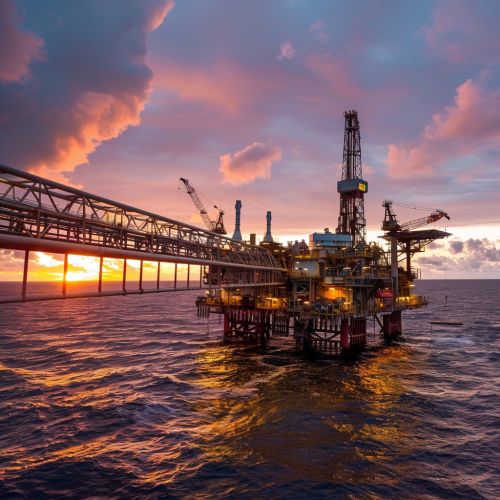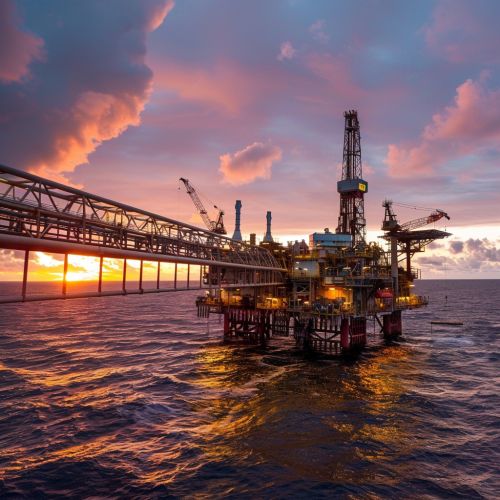North Sea oil
North Sea Oil
North Sea oil refers to the petroleum and natural gas resources located beneath the North Sea, a marginal sea of the Atlantic Ocean bordered by Great Britain, Scandinavia, Germany, the Netherlands, Belgium, and France. The discovery and exploitation of these resources have had significant economic, political, and environmental impacts on the surrounding regions.


History
The history of North Sea oil exploration dates back to the 1960s, following the discovery of significant oil reserves in the region. The first major discovery was made in 1969 with the Ekofisk field in the Norwegian sector. This discovery spurred further exploration and development, leading to the establishment of numerous oil fields across the North Sea.
The 1970s saw a boom in North Sea oil production, particularly after the 1973 oil crisis, which highlighted the strategic importance of these resources. By the 1980s, the North Sea had become one of the world's most important oil-producing regions, with the United Kingdom and Norway being the primary beneficiaries.
Geology
The North Sea basin is characterized by a complex geological structure, which includes a variety of sedimentary basins, rift systems, and fault lines. The primary hydrocarbon-bearing formations are located in the Central Graben, Viking Graben, and Moray Firth Basin. These formations contain significant reserves of both oil and natural gas, trapped within porous rock layers.
The geological history of the North Sea basin spans several hundred million years, with the most significant hydrocarbon deposits formed during the Jurassic and Cretaceous periods. The region's complex tectonic history has resulted in the formation of numerous structural traps, which have played a crucial role in the accumulation of hydrocarbons.
Exploration and Production
Exploration and production of North Sea oil involve a combination of offshore drilling, seismic surveying, and advanced extraction techniques. Offshore drilling is conducted using a variety of platforms, including fixed platforms, semi-submersible rigs, and floating production storage and offloading (FPSO) units.
Seismic surveying is a critical component of the exploration process, as it allows geologists to map the subsurface structure and identify potential hydrocarbon reservoirs. This technique involves the use of sound waves to create detailed images of the subsurface, which can then be analyzed to determine the location and size of oil and gas deposits.
Advanced extraction techniques, such as enhanced oil recovery (EOR) and horizontal drilling, have been employed to maximize the recovery of hydrocarbons from North Sea fields. EOR techniques, such as water flooding and gas injection, help to maintain reservoir pressure and improve the flow of oil to the production wells. Horizontal drilling allows for the extraction of oil from thin or fragmented reservoirs, which would be difficult to access using traditional vertical wells.
Economic Impact
The exploitation of North Sea oil has had a profound impact on the economies of the surrounding countries, particularly the United Kingdom and Norway. The revenue generated from oil production has contributed significantly to national GDP, government budgets, and employment.
In the United Kingdom, the development of North Sea oil fields has been a major driver of economic growth since the 1970s. The industry has created thousands of jobs, both directly and indirectly, and has generated substantial tax revenues for the government. The establishment of the Oil and Gas Authority (OGA) in 2015 has further strengthened the regulatory framework governing the industry.
Norway has also benefited immensely from its North Sea oil reserves. The country established the Government Pension Fund Global (GPFG), commonly known as the Oil Fund, to manage the revenue generated from oil production. The GPFG is one of the largest sovereign wealth funds in the world, and it plays a crucial role in ensuring the long-term financial stability of the Norwegian economy.
Environmental Impact
The extraction and production of North Sea oil have raised significant environmental concerns. Offshore drilling and production activities can result in oil spills, which pose a serious threat to marine ecosystems. The Deepwater Horizon spill in the Gulf of Mexico in 2010 highlighted the potential risks associated with offshore oil production and prompted a reevaluation of safety and environmental regulations in the North Sea.
In addition to the risk of oil spills, the routine operations of offshore platforms can have a range of environmental impacts. These include the discharge of drilling muds and cuttings, the release of produced water, and the emission of greenhouse gases. The industry has made significant efforts to mitigate these impacts through the implementation of best practices and the adoption of advanced technologies.
Technological Innovations
Technological innovation has played a crucial role in the development of North Sea oil resources. The harsh environmental conditions and deepwater locations of many North Sea fields have necessitated the development of specialized equipment and techniques.
One of the most significant technological advancements in the industry has been the development of subsea production systems. These systems allow for the extraction of hydrocarbons from deepwater fields without the need for large surface platforms. Subsea production systems include a range of components, such as subsea trees, manifolds, and pipelines, which are installed on the seafloor and connected to surface facilities via risers.
Another important innovation has been the use of floating production storage and offloading (FPSO) units. FPSOs are ship-shaped vessels that can process and store hydrocarbons produced from offshore fields. They offer greater flexibility and mobility compared to fixed platforms, making them particularly well-suited for the development of marginal or remote fields.
Future Prospects
The future of North Sea oil production is uncertain, as the industry faces a range of challenges and opportunities. One of the most significant challenges is the depletion of existing reserves. Many of the largest and most productive fields in the North Sea are now in decline, and the discovery of new reserves has become increasingly difficult.
In response to these challenges, the industry has focused on maximizing the recovery of hydrocarbons from existing fields through the use of enhanced oil recovery (EOR) techniques and the development of smaller, previously uneconomic fields. The decommissioning of aging infrastructure is another major challenge, as the cost and complexity of dismantling offshore platforms and pipelines are significant.
Despite these challenges, the North Sea remains an important region for oil and gas production. The development of new technologies, such as carbon capture and storage (CCS) and the integration of renewable energy sources, offers potential opportunities for the industry to adapt and evolve in response to changing market conditions and environmental concerns.
